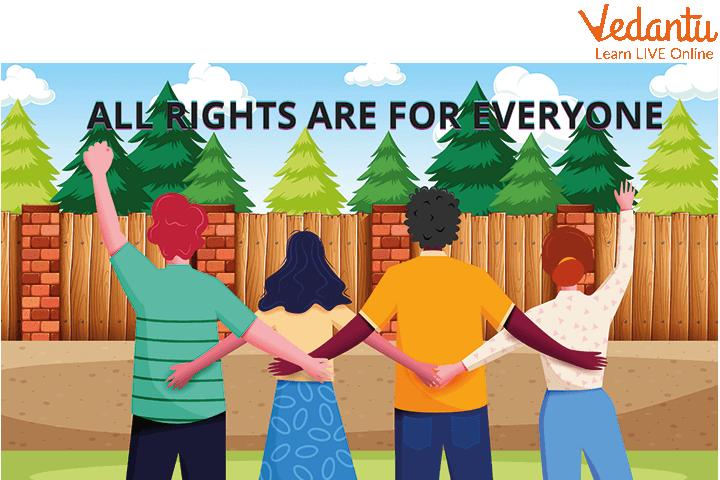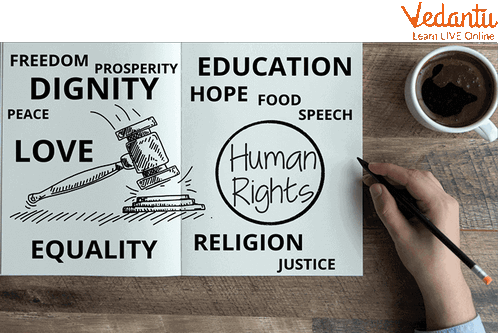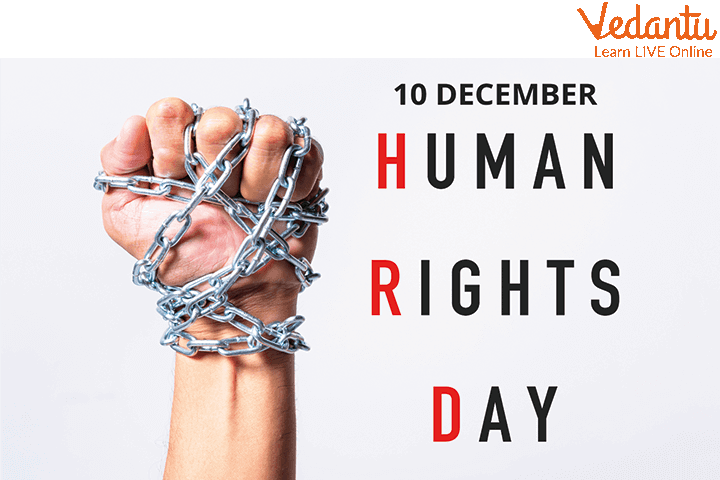




Why Understanding Human Rights Empowers Children
Human Rights are the basic requirements guaranteed to a human because he or she simply belongs to the human race. If we think of whom all comes under the category of rights, it is everybody, regardless of colour, race, gender, nationality, language, or religion. Some basic human rights lists contain the right to travel, the right to freedom of speech, the right to life and liberty, the right to practice any religion, and so on. In this article, we will talk about basic human rights, the human rights and responsibilities list, the definition of rights, and their importance.
Basic Human Rights for Kids
To understand the whole human race as one and to give them the basic requirements in the set of rules and regulations is known as basic human rights. There stands a difference between human rights and civil rights which are guaranteed by the government to their citizens. Human rights are also known as universal rights as they are available to everybody irrespective of age, gender, race, or religion and so they are also known as basic human rights.
Children's rights are a part of human rights, ensuring the protection and well-being of children as individuals. These rights include:
Protection from harm, including freedom from slavery, torture, and mistreatment.
Access to education, healthcare, shelter, and proper nutrition.
The right to express opinions and speak freely.
The right to equality.
A clean environment and a safe living space.
The right to life.
Personal security.
Freedom from cruel, inhuman, or degrading treatment.
The right to identity and nationality.
A decent standard of living.
The United Nations Convention on the Rights of the Child (UNCRC), adopted in 1989, is the most widely ratified human rights treaty. It focuses on protecting children from harm, ensuring their growth and development, and empowering them to participate in society.
Before this, the Declaration of the Rights of the Child, adopted by the UN General Assembly in 1959, laid the foundation for international laws concerning children's rights.
Also Check: Speech on Human Rights
Definition of Human Rights for Kids
What is a Right for Kids?
The definition of rights stands as basic guaranteed powers regardless of any difference to the human race as one and they are duties of the government to be protected in every situation. They are basic in nature and stand valid for all in every situation leaving some critical rare situations.

The Importance of All Rights for All the People
5 Basic Human Rights
Many human rights are recognised by all the countries around the globe but the five human rights which are widely guaranteed are firstly the right to life secondly the right to freedom from torture, the right to freedom of work followed by the right to freedom of expression, and the last right to religion all these constitute 5 basic human rights. There are many other things on the list leaving all these 5 basic human rights.

Different Basic Human Rights
The Human Right to Travel
Basic human rights are guaranteed by the government and some are recognised worldwide by different international bodies as a united nation which was formed for the betterment and safeguards of rights.
According to the UN Universal Declaration of Human Rights (Article 13.1), everyone has the right to the freedom of movement and residence within the borders of each state, and everyone has the right to leave any country, including his own, and to return there. In some countries like India, the right to travel comes under the right to liberty.
This right is not limitless as it comes with some restrictions for the safety, border, and resident period but the right to move allows the human right to travel for visits, jobs, vacation, and settlements and are based on periods as per different countries’ rules.

Human Rights Day Celebrated Worldwide
Human Rights and Responsibility List
As human rights are the fundamental source to the protection of life it is to be protected and guarded which comes with the responsibilities of the government. The human rights list and the responsibilities list are as follows.
Read About: Speech on Human Rights Day
How are Children’s Rights Violated?
Sadly, children’s rights are often violated worldwide, starting from birth. For example, 290 million children lack birth registration, leaving them without legal identity or proof of existence. This prevents access to education, healthcare, and future opportunities like jobs. Girls in low-income countries face even higher risks, with only a 50% chance of having a legal identity and claiming their rights.
Globally, over 61 million children are out of primary school. Each year, 150 million girls and 73 million boys face sexual abuse. In some places, girls as young as nine are forced into marriage, and children as young as six are treated as adults in criminal courts. Around 330,000 migrant and refugee children are held in detention yearly, often separated from their families.
Extreme poverty affects one in six children, increasing risks like domestic violence, child labour, exploitation, and early marriage. During the Covid-19 pandemic, this number grew significantly. Additionally, in 2020, nearly 820 million children lacked basic handwashing facilities at school, violating their right to health and exposing them to greater risks of infection.
List of Human Rights for Kids
The Declaration of Human Rights for Kids explains the basic rights that every child should have, like the right to be safe, go to school, have enough food, and live without fear. It ensures all children are treated with fairness, respect, and care, no matter where they are from.
Right to life
Right to freedom of expression
Right against exploitation
Right to education
Right to Religion
Right to equality
Right to equality before the law
Right to constitutional remedies
Right to Movement
Right to assemble and many more
Responsibilities List
The government has to provide basic human rights to its citizens.
Government has to promote and protect the human rights of the individual
Government has to think about new ideas for better implementation of rights
The government has to protect the basic human rights of outsiders from nationals.
Punish and take violations of human rights seriously.
To summarise, human rights are the basic rights focusing on the whole of mankind as one and are guaranteed based on the oneness of the entire human race. It is known as basic because of its nature of origin, its adaptability, and how it applies to all irrespective of class, colour, race, location, nationality, gender, or any other difference amongst the whole human tribe. It is different from civil rights which are guaranteed and made as per government but it is still promoted and protected by the government and forms the basis for the human rights and responsibilities list of the government.
FAQs on Human Rights for Kids: What Every Child Should Know
1. What are human rights for kids in simple terms?
Human rights for kids are a special set of promises that ensure every child is treated fairly and has what they need to grow up safe, healthy, and happy. These include the right to be safe from harm, the right to go to school, the right to have healthy food, and the right to be heard, no matter who they are or where they live.
2. Why are human rights considered 'basic' or 'fundamental'?
Human rights are called 'basic' or 'fundamental' because they are not earned or granted as a favour; you are born with them. They are universal, meaning they apply to every single person on Earth, simply because they are human. This foundation ensures everyone has a chance to live with dignity, freedom, and equality.
3. What are five of the most important rights for a child?
While all rights are important, five key rights for every child are:
- The Right to Life and Health: Access to medical care, nutritious food, and clean water.
- The Right to Education: The opportunity to go to school and learn.
- The Right to Protection: To be kept safe from violence, neglect, and exploitation.
- The Right to an Identity: To have a name and a nationality from birth.
- The Right to Express Themselves: To share their opinions on matters that affect them.
4. Who is responsible for protecting a child's human rights?
The primary responsibility for protecting a child's rights lies with their parents or guardians. However, the government of their country has the ultimate duty to ensure these rights are respected and fulfilled for all children. International organisations like UNICEF (The United Nations Children's Fund) also work to protect children's rights globally.
5. What is the main international agreement that protects children's rights?
The main international agreement is the United Nations Convention on the Rights of the Child (UNCRC). It is the most widely accepted human rights treaty in history and provides a complete list of rights for all children, guiding governments on how to ensure their well-being and development.
6. How can schools help in upholding children's rights?
Schools play a vital role by not only fulfilling the right to education but also by creating a safe and inclusive environment. They uphold rights by treating all students equally, protecting them from bullying, teaching them about their rights and responsibilities, and allowing them to express their ideas respectfully.
7. How can parents explain the importance of human rights to their children?
Parents can teach children about human rights through simple, everyday examples. This includes teaching them about fairness (sharing toys), respect (listening when others speak), and kindness (standing up for a friend). Explaining that every person deserves to be treated with this same level of respect helps build a foundational understanding of human rights.
8. What is the difference between a 'right' and a 'privilege' for a child?
A right is something essential that every child is entitled to have, like safety, food, and education. It cannot be taken away. A privilege is something extra that is earned or given as a reward, like getting extra screen time or a new toy. For example, having a safe place to live is a right, while having a video game console is a privilege.
9. How are universal human rights different from the Fundamental Rights in the Indian Constitution?
Universal Human Rights are global standards that apply to every person worldwide, recognised by international agreements. Fundamental Rights, as outlined in the Indian Constitution, are legally enforceable rights guaranteed specifically to citizens of India by the country's laws. While many Fundamental Rights (like the Right to Equality) are based on human rights, their legal enforcement is specific to the Indian judicial system.
10. Besides having rights, do children also have responsibilities?
Yes, rights and responsibilities go hand-in-hand. While children have the right to be heard, they have the responsibility to listen to others. While they have the right to an education, they have the responsibility to learn and respect their teachers and peers. Understanding responsibilities helps children grow into respectful members of their community.





















